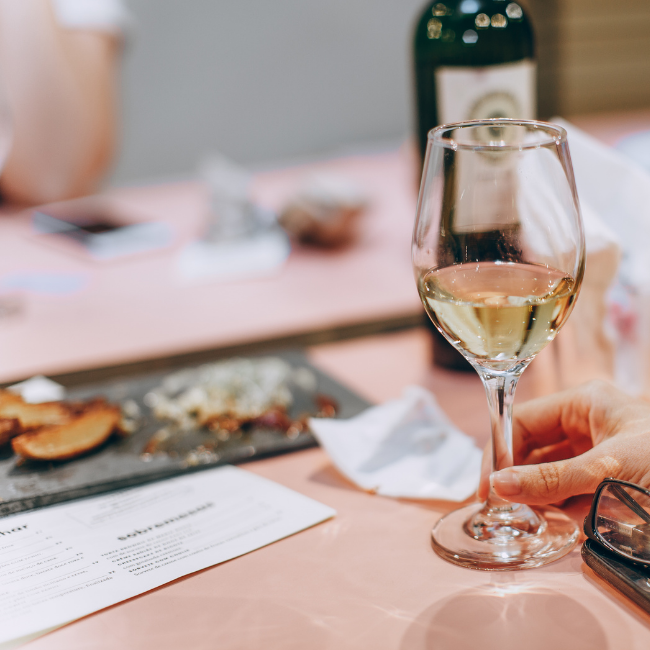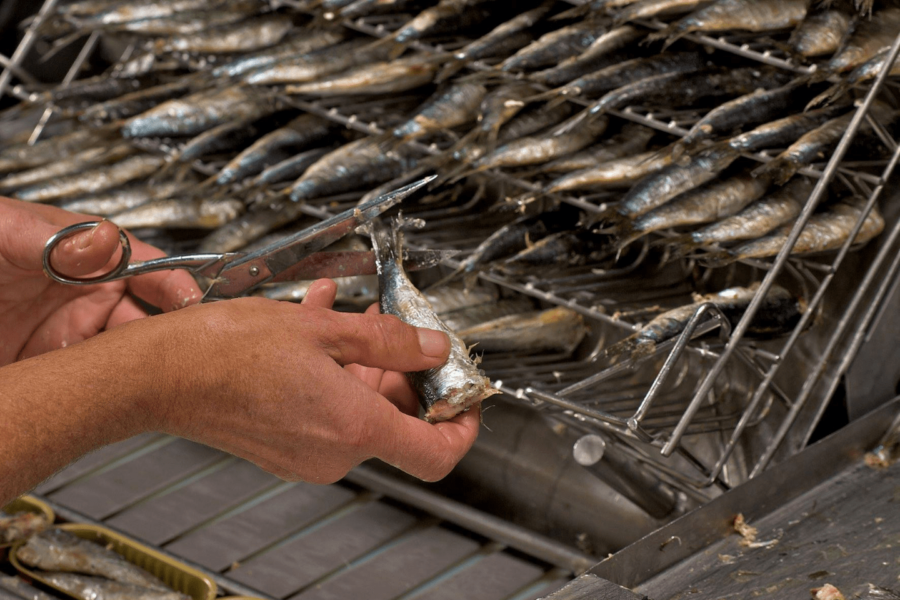Cannery Gonidec has created its own sustainable fishing charter, that includes strict regulatory requirements, guaranteeing quality and sustainable resource management.
Sustainable fishing | Responsible fishing charter
In France, the fish canning industry is firmly committed to preserving the sustainability of marine resources. It is voluntarily developing numerous responsible actions aimed in particular at limiting fishing capacity, using fishing methods that prevent the catching of unwanted species in nets, establishing the traceability of fish from the sea to the can, etc.
The industry complies with strict regulatory requirements, guaranteeing quality and sustainable resource management. In particular, it is subject to European regulations under the Common Fisheries Policy (CFP):
- fishing capacity,
- area of activity (areas temporarily or permanently closed),
- fishing effort (limits on vessel capacity and authorized fishing time),
- catches (Total Allowable Catches – TACs, quotas, minimum sizes),
- gear (sizes of gear, meshes, length of nets, etc.), etc.
Numerous checks are carried out in vessels and ports to ensure compliance with the regulations in force. Vessels can be checked at any time by different authorities (gendarmerie, European controllers, maritime affairs…), including by satellite.
French fish canneries attach great importance to the fight against marine waste and their fishing partners act at sea to limit it. In Brussels, for example, the Europêche organisation works with the “Waste Free Ocean” Foundation to collect floating waste, sort it and recycle it. And in France, the Coopération Maritime is involved in the PechPropre project aimed at avoiding fishing waste in the marine environment. As for tuna vessels, which already use non-gill nets to avoid catching turtles or sharks, they are currently studying the design of fishing gear made of biodegradable materials to prevent them from stranding in the event of loss. In addition, France is expected to formalise the reception of ship-generated waste in ports in a new piece of legislation to be published in the course of 2021.
- Seasonality:
We work the fish according to the fishing seasons defined by the RFMOs, our manufacturing workshops are therefore used differently throughout the year to work mostly fresh fish, with the species of themoment. The fish are bought during the fishing period respecting the reproduction periods. We do not select the juveniles.
- Marine resources: We are committed to supply ourselve through responsible fishing, without which our activity will not be able to continue in the future.
But how is bolinch fishing sustainable? | Responsible fishing charter
The bolsinch fishery is an inshore fishery. It is designed to catch pelagic fish, especially blue fish such as mackerel or sardines. It is carried out between May and October at night by boats that sail within the territorial waters (12-mile limit). The boats return to port between each fishery.
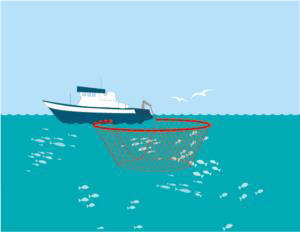
The purse seine or purse seine is a straight net with floats on the top and ballast on the bottom. It is deployed at high speed to encircle a school of fish previously detected visually or by sonar.
A sliding cable (the purse seine) is used to “furl” the net (close the bottom). The pocket created is gradually narrowed around the encircled fish. It is gently brought back along the vessel, then the fish is taken on board with a “salabarde” (large landing net).
If the fish caught is not the one sought or is not the size expected, the bag is reopened and the entire school escapes immediately. Fishing with bullheads is considered sustainable because this net is a gear that very rarely comes into contact with the bottom. It therefore does not impact marine habitats. The bollfish also makes it possible to very precisely target schools of sardines which have a group (gregarious) way of life and mix little with other species. It causes little or no by catch.
- Tuna fishing techniques:
There is no ideal fishing method: each practice has its advantages and disadvantages. Both in terms of the preservation of the resource and marine ecosystems and the working conditions of fishermen.
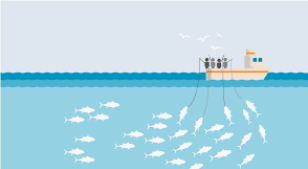
To ensure the sustainability of species, we favour fishing techniques with the least environmental impact in our purchases: guaranteed fishing without FADs (Fish aggregating devices) , trawling, pole and line fishing, seine fishing, free bank fishing.
And we strive to diversify the geographical origin of our supplies.
- Traceability:
The fish are caught in season, from legal fishing according to the regulation 1005/2008 IUU fishing (= Illegal, Unreported and Unregulated fishing):
- Dolphin Safe” certificate, catch certificate, signature of the captain with the name of the boats and fishing period or certificate of artisanal fishing with a boat under 12m.
Catch certificates and dolphin safe certificate are obligatory to import canned tuna on the US market.
- Transhipment at sea prohibited
- Reliable traceability system
- Trained operators or DNA analysis for species identification (copy of the analysis to be attached to the BL).
From the boat to the plate, we are committed to working with the fisheries and fish wholesalers to ensure traceability and
fish selection. This commitment is enhanced by the indication on each tin of sardines of the name of the fishing boat, in addition to the ocean of origin.
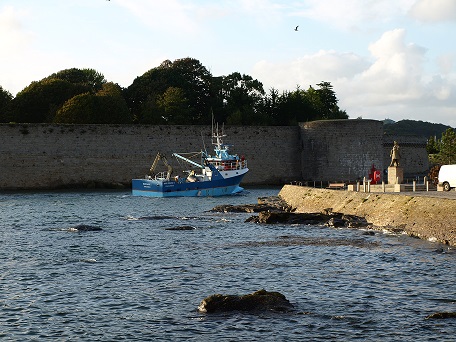
“My father sold fishes to Jacques Gonidec’s father, and nowadays, I’m selling my fishes to Jacques Gonidec. We do have a strong complicity because we love well done job and respects the nature.” | Patrice Pétillon, Manager of a
purse seine boat, War Roag in Concarneau, Brittany, France.
Charter of Commitment of French Fish Canneries
Since 2014, Conserverie Gonidec has signed the Charte d’Engagement des Conserveries françaises de poissons (Charter of Commitment of French Fish Canneries), which defines the good practices of canneries in eight articles including:
FIAC Charter “Preserve maritime resources”.
- Supplies from legal and registered fisheries
- Control of upstream traceability: ensure that there has been no transhipment or mixing of species.
- Control of documentary guarantees according to the type of supply
- Traceability documents available, transmitted by the supplier. For example:
Auctioned purchases France/EU: sales notes, invoices, delivery notes
Non-auctioned purchases France: invoices, new remote declaration system France AGRIMER
Non-EU purchases: catch certificates, Dolphin Safe, Captain’s statement, …
=> Gonidec specifications to be enclosed with each fish order form, to be completed by the supplier.
1.2 Monitoring the state of sardine, mackerel and tuna stocks
- In order to prevent overfishing or illegal fishing, a system of stock assessment according to supply areas is in place through the Resource Sheets, reviewed annually and transmitted by CITPPM by email, archived on COMMUN => Quality => Suppliers => Fish Suppliers.
=> These resource data are therefore available in the concerned departments (Management, quality, purchasing, R&D, production, etc.).
1.3 Definition of a purchasing policy integrating the preservation of marine resources
- The state of stocks is taken into account by the Purchasing Department for each order or listing, and by the R&D Department when choosing a new species of fish to work with.
- See procedure PR ACH 01 concerning the rules of referencing of a new supplier or new raw material.
- No integration of species in new recipes whose stocks are over-exploited or over-fished. The R&D Department search for alternative solutions.
- The monitoring of the tonnages of fish purchased, in stock and put into production is a monthly indicator managed by the Purchasing Department and followed up with the Management.
FIAC Charter “Promoting sustainable fisheries”.
2.1 Commitment to approaches to promote sustainable and responsible fisheries that respect biodiversity
Conserverie Gonidec is a member of the FIAC, which itself participates in the financing of the OCCUP.
The specifications signed by suppliers include requirements on Sustainable Development criteria. Examples: diversification of fishing areas where possible, prevention of illegal fishing, fight against overfishing, type of gear used, no particular destination … application for membership of the ISSF.net to ship owners, fisheries or traders.
2.2 Compliance with RFMOs (Regional Fisheries Management Organisations) by suppliers or participation in regional fisheries regulation processes
The Supplier Commitment Charter signed by suppliers includes a request for a commitment to sustainable and responsible fishing, with respect for biodiversity. Suppliers must provide us with the signed list of boats registered in this process, where applicable.
2.3 Collective support from the EU for the strengthening of RFMOs in their scientific and technical capacity for resource assessment
A person from Gonidec Cannery participates, in relation to his or her knowledge and responsibilities within the company, in at least one resource knowledge improvement project (FIAC or CITPPM), for at least one species.
Signature of the attendance sheet and distribution of the minutes of the FIAC or CITPPM meetings.
Consum’ Actor: we wish to further increase our efforts and actively work towards better practice in the exploitation of marine resources. A guarantee of respect for the oceans that consumers can now find on our canned fish through our “Responsible Fishing” charter.
Discover all our seafood products.

